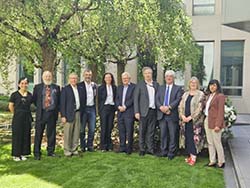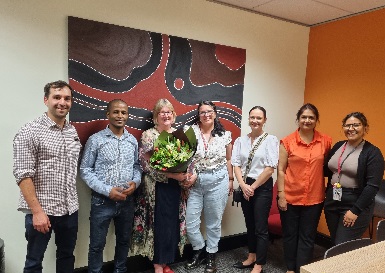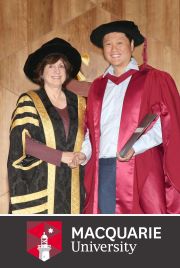Our news
Parliamentary Budget Office, Panel of Experts

GenIMPACT's Director, Distinguished Professor Deborah Schofield, joined with other members of the Panel of Experts in Canberra to offer independent advice and insight into the Parliamentary Budget Office's policy fiscal analysis. Meet the members of the Panel of Experts.
Mito Foundation Research Prize for Excellence in Research
Katherine Lim, a Research Fellow, with GenIMPACT was recently awarded the Excellence in Mitochondrial Research by The Mito Foundation. Presented annually, the Mito Foundation awards honour individuals who made an outstanding impact on mitochondrial disease through research, support, education, fundraising or advocacy. Lim’s paper titled ’The Burden of Mitochondrial Disease: Healthcare and Societal Costs‘ made an important contribution to understanding the cost of the disease, and had the advantage of being based on patient-reported and link data. The paper was recently published in the journal, Value in Health. This paper was part of a larger project on the economic and psychosocial impacts of mitochondrial disease, headed by Distinguished Professor Deborah Schofield from GenIMPACT in collaboration with Professor Carolyn Sue and her team from NeuRA, UNSW
GenIMPACT awarded $1.5m NHMRC grant for retinal disease research
Researchers from the Macquarie University Centre for Economic Impacts of Genomic Medicine (GenIMPACT) have received about $1.5m for an NHMRC Partnership Grant to further their research into the costs of Inherited Retinal Diseases (IRDs).
Inherited retinal diseases are a diverse category of genetic eye conditions marked by retinal malfunction and degeneration, which frequently leads to progressive vision loss and blindness. These eye disorders impact around one in 1,000 people and are currently the primary cause of blindness in working-age adults in Australia.
This collaborative project aims to estimate the national social and economic impacts of specific IRDs and the cost effectiveness of using genomic and functional genomic investigations and precision medicine. This will support translating these targeted therapies into clinical practice and policy, thereby improving the health and life of patients with IRDs and their carers. GenIMPACT will be working closely with investigators from The University of Sydney, Children’s Medical Research Institute, Save Sight Institute, University of Western Australia University of Melbourne, and University of Auckland.
“Despite the large number of patients suffering from IRDs, there is little robust Australian data on the cost and quality of life of IRDs, particularly for specific subtypes, no study of cost-effectiveness of genomic investigations, and few relevant international studies, all of which have significant limitations,” said Professor Deborah Schofield, Director of GenIMPACT and the new project’s lead Chief Investigator.
“This gap between the promise of genomic medicine and the economic evidence required to make it accessible to those who need it presents a substantial roadblock for new targeted therapies. Our proposal responds to these priorities by capturing robust data about the cost and quality of life associated with IRDs and use of genomic sequencing and functional genomic studies in a clinical cohort, to develop a world first model to provide critical evidence of the cost-effectiveness of genomic medicine for IRDs, and data to support access to targeted management.”
The new NHMRC grant will be accompanied by nearly $3.4 million in cash and in-kind contributions from 17 partners spanning Australia and New Zealand. Our healthcare partners include: Sydney Children’s Hospitals Network, South Eastern Local Health District, The Royal Victorian Ear and Eye Hospital, Lions Eye Institute, Te Whatu Ora Te Toka Tumai Auckland, Royal Australian and New Zealand College of Ophthalmologists, and the Agency for Clinical Innovation. Our consumer vision and philanthropic partners are: Cure Blindness Australia, Genetic Alliance Australia, Guide Dogs NSW/ACT, Retina Australia, The SA and GJ Ombler Charitable Trust, and Vision Australia. Our industry partnerships helping us to realise our important research are Illumina Australia, Janssen Australia, Belite Bio, PYC Therapeutics, and Nacuity Pharmaceuticals.
The project will harness well-established partnerships between research colleagues, clinical services, industry professionals, government and consumer organisations to turn research into real-life impact for patients.
This project aims to build on the team’s prior work to provide evidence to support access to genomic investigation and targeted therapies for patients with genetic disorders.
Deputy Vice-Chancellor (Research) Professor Sakkie Pretorius congratulated the researchers on being awarded a prestigious NHMRC Partnership Grant.
“Precision medicine promises to transform the future of healthcare, and this collaborative project is at the cutting edge of research into the possibilities of applying these new technologies to a life-changing condition impacting many Australians.
“Our Macquarie researchers are joining forces with numerous partners to translate evidence into real-world solutions that will improve the lives of people affected by Inherited Retinal Diseases.”
New Medicare rebate for carrier screening will mean families do not have to go through losing a child to discover their risk of passing on a rare condition as a result of MSAC 1675
Patients who are suspected of having mitochondrial diseases can now access genomic testing covered by Medicare, following the approval of a submission co-led by the Macquarie University Centre for Economic Impacts of Genomic Medicine (GenIMPACT).
From 1 November, patients, their biological relatives and reproductive partners can use the Medicare-subsidised mitochondrial genomic tests to get a more definitive diagnosis earlier, allowing for better patient care and quality of life. It eliminates an often long and arduous diagnostic journey, and allows for more appropriate, accessible and targeted management, whilst informing reproductive planning. The new Medicare rebate for carrier screening will mean families do not have to go through losing a child to discover their risk of passing on a rare condition.
This milestone follows the Department of Health and Aged Care’s Medical Services Advisory Committee’s (MSAC) endorsement in February of an application for the approval of whole genome sequencing for use in diagnosing primary mitochondrial disease, which was prepared by, Mito Medical Network with GenIMPACT and NeuRA and Royal North Shore Hospital and The Children’s Hospital at Westmead.
The GenIMPACT team, headed by Professor Deborah Schofield, focuses primarily on the potential of genomics and similarly path-breaking new innovations that improve human health, where these advances have significant impacts on the economy and society.
New research provides clearer view of retinal diseases costs
New research published in The Medical Journal of Australia by Macquarie University researchers and their collaborators finds that inherited retinal diseases (IRDs) cost the Australian economy $781 million to $1.56 billion annually. This finding could help policy makers secure funding for life-changing gene therapies for people living with IRDs.
Inherited retinal diseases are a broad group of genetic eye disorders characterised by retinal dysfunction and degeneration, often leading to progressive vision loss and blindness. These eye conditions affect about one in 1000 people and are now the leading cause of blindness in working age adults.
The new research puts the individual costs in plain sight, finding a lifetime cost of $5.2 million per person with an IRD, of which 87 per cent were societal costs such as National Disability Insurance Scheme (NDIS) support, income and welfare support, school adjustments, and supported independent living; and 13 per cent were health care costs which includes prescriptions, allied health services and inpatient care.
Professor Deborah Schofield, the Director of the Centre for Economic Impacts of Genomic Medicine (GenIMPACT) at Macquarie University, led the team of researchers from Macquarie Business School, with Professor Robyn Jamieson Head of the Eye Genetics Research Unit at the Children's Medical Research Institute at SCHN, Westmead, and Professor of Genomic Medicine at the University of Sydney and Professor John Grigg Head of Ophthalmology from the Save Sight Institute at the University of Sydney.
Deborah Schofield, Joshua Kraindler, Owen Tan, Rupendra N Shrestha, Sarah West, Natalie Hart, Liny Tan, Alan Ma, John R Grigg and Robyn V Jamieson (2023) The health care and societal costs of inherited retinal diseases in Australia: a microsimulation modelling study. Med J Aust online 19 June 2023 DOI: 10.5694/mja2.51997 PMID: 37301731.
Listen to a personal story as to why this research is important: SBS Podcast
Congratulations Deborah Schofield - 2023 Jim Piper Award finalist
Distinguished Professor Deborah Schofield, was nominated as a finalist for the Jim Piper Award for Excellence in Research Leadership presented at the 2023 Macquarie University Academic Awards on 15 November 2023.


Dr Tony Roscioli - Awarded 2023 NSW Health Pathology for Research Excellence for Novel Disease Gene Identification Program for Genetic Conditions
GenIMPACT were recognised as part of the team led by our esteemed colleague, Professor Tony Roscioli, who has been awarded a 2023 NSW Health Pathology for Research Excellence award for Novel Disease Gene Identification Program for Genetic Conditions: Every Child Deserves a Diagnosis. Congratulations Tony!
Researcher Owen Tan awarded PhD
Congratulations to colleague, Dr Owen Tan on being awarded his PhD. Owen's parents and young family, together with supervisors: Professor Deborah Schofield and Associate Professor Rupendra Shrestha, celebrated his graduation on 5 October 2023.

